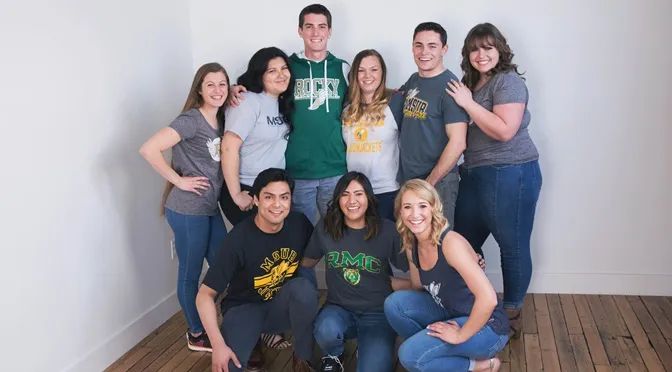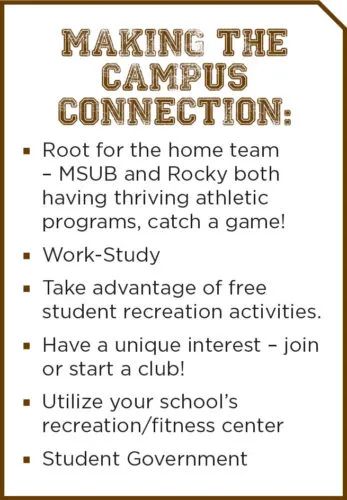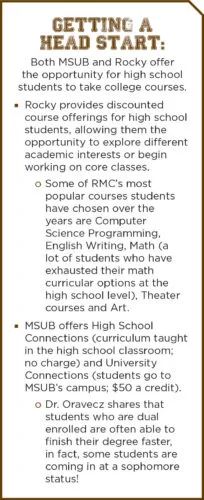
Going 'away' to college at home
Often when our kids start dreaming the college dream (I mean really dreaming, not the imaginings of their 9 year old selves when they swore they were going to live with us forever), they envision going away. Far, far away. Or, at the very least, to a different zip code than the one they’ve been calling home; soaking in those college-life experiences they’ve grown up seeing on the big screen. So, when “going away” to college ends up being in their hometown, it might not jive with their original imaginings, but that doesn't mean they can't have the college experience they had always pictured.We chatted with Dean of Enrollment Services at Rocky Mountain College, Austin Mapston, and Vice Chancellor of Student Affairs at Montana State University-Billings, Dr. Joe Oravecz, to get an idea of what it might look like for a student who chooses to stay local for their post-high school education, and how students can (should?) engage in an immersive collegiate experience in their own backyard.
 “Experiencing” College VS “Attending” College
“Experiencing” College VS “Attending” College
One of the benefits of attending college locally is the familiarity. You already know the community, familiar faces probably abound around campus, the safety net of having “your people” Right There is appealing. So, it can be easy, both Mapston and Dr. Oravecz say, to not allow oneself to engage in college fully – to simply attend college versus experience it.
Signs that your child might be “attending” instead of “experiencing” college:
- First, both RMC and MSUB recommend living on campus if possible. Becoming engaged in campus life is that much easier when you’re literally living it.
- National statistics show that, on average, students who live on campus (especially during their first year) have roughly a 15% higher retention rate than students who don’t.
- Living on campus allows easier access to the support and resources available on campus.
- FYI: Starting this year, MSUB has begun offering some residence hall scholarships.
- If they’re not living on campus, the entirety of their time at school is spent in class and then back home again or to their job off campus.
- For students who choose to live off campus Mapston advises them (and encourages families to support their student) to involve themselves in some kind of campus activity, to “connect in some meaningful way with a student club or organization or study group; to take advantage of the many free weekend outdoor recreation activities where other students are involved.” Once again, helping to tether them to the school, allowing them to experience the collegiate atmosphere.
- Their weekends/outside of class time are spent with only the same friends they grew up with.
- It might be comfortable and easy to stick with high school friends, but Dr. Oravecz challenges students to examine if they’re allowing themselves to grow. You don’t have to sever ties, but ask yourself “Are you getting out of that high school mentality? Which is why you go on to college; hopefully you’re learning and gaining those life skills.”
Obviously we attend college to learn, explore new ideas, and ultimately gain a degree or certificate, but as Dr. Oravecz says, “It’s not just about the education, it is how the education leads to understanding in implementing inside-the-classroom to outside-of-the classroom, which comes involved with the co-curricular activities and becoming engaged with the University.”
Preparing for launch
 In discussing the parents’ role in preparing for and sending off their young adult to college, Dr. Oravecz shares that he emphasizes to parents that they’re not “Letting go, you will never let go of your child.” Rather, he prefers the term, “Launching. That you’re launching your child into the next chapter of their life.” Which begs the question: How are you preparing for that launch? How are you preparing your child for that?
In discussing the parents’ role in preparing for and sending off their young adult to college, Dr. Oravecz shares that he emphasizes to parents that they’re not “Letting go, you will never let go of your child.” Rather, he prefers the term, “Launching. That you’re launching your child into the next chapter of their life.” Which begs the question: How are you preparing for that launch? How are you preparing your child for that?
If your child is living at home, perhaps some of the expectations are:
- You’re going to get involved at school.
- We will encourage you to meet new people, get actively engaged…
- We are going to help support this investment in your education.
Ultimately, as far as “House Rules” go, each family has to figure that out together. However, we fully support you in invoking the “As an adult human being there are simple, common courtesy rules to follow” e.g., calling if you're going to be later than usual, picking up after yourself…Which goes hand-in-hand with this timeless gem: “If you want to be treated like an adult, act like one.”
If your child is living in the residential halls:
- The primary role of parents is to act as a coach for your student, says RMC’s August Parent Newsletter.
- Be available for support – don’t be their problem solver, be their sounding board.
- Encourage your student to get involved in campus activities (just because they’re living there doesn’t mean they’ll automatically put themselves out there, Son in Law, anybody?)
In the end, it doesn’t matter if your child is attending school locally and living at home or living in the dorm, or attending school in another state, explains Mapston, because “That familial connection and support is important, and we are as close as we need to be, regardless of distance. Everyone is a phone call away.” Local students have the benefit of maintaining those Sunday family dinners, but they’re also able to help bridge a familial gap for students from further away. Both Mapston and Dr. Oravecz note the benefit of local students “adopting” out-of-area students and bringing them home for the holidays or those family meals. Mapston adds, “We try to provide as much familial support as an institution that we can, but our students do an exceptional job of caring for each other as well.”
 Getting to know MSUB & RMC
Getting to know MSUB & RMC
Over the course of our conversations at each respective school, both gentlemen noted that when making the decision regarding which college to attend, perhaps one of the key points of consideration should be “fit”:
- Large or small campus experience?
- Do you want to be able to get lost in the crowd, or are you hoping to be able to “Make a difference from day one”? Something more easily accomplished on a smaller campus.
- Smaller campus often means smaller class sizes, more 1:1 interaction with faculty.
- Internships/research opportunities with faculty can begin as early as freshman/sophomore years.
- What area of study is your student interested in pursuing?
- Cost and scholarship opportunities.
- MSUB offers scholarships specifically for students that live in the Yellowstone County area. (msubillings.edu/scholarships/yellowjacketexcellence)
- Estimated Cost of Attendance: msubillings.edu/finaid/CostOfAttendance | www.rocky.edu/admissions/tuition-fees
We asked both schools to share some things that prospective students might be surprised to learn about their institution:
 Rocky – Diversity of the campus. Though Rocky is a small institution by design (which allows for 1:1 interaction and personal connection), there are 48 states and 16 countries represented on campus.
Rocky – Diversity of the campus. Though Rocky is a small institution by design (which allows for 1:1 interaction and personal connection), there are 48 states and 16 countries represented on campus.- MSUB – Oravecz notes they’ve been surprised to discover that a lot of local students have never really set foot on campus, so when they do, they’re realizing what a beautiful campus it is.
- Rocky – For many students, attending Rocky and staying in Billings is more affordable than attending many state institutions, but in particular, out of state tuitions. (Some of that has to do with being able to graduate in a timelier manner, says Mapston).
- MSUB – Students touring campus discover they can engage with faculty in much the same way they did with their high school teachers. There's familiarity between faculty and students – they're not just a number.
- Rocky – Our students have one of the highest job placement rates of any institution in the Northwest and one of the lowest debt ratios for students in the Northwest.
- MSUB & Rocky – Both schools point to the availability of internships and the ability to make sound professional contacts in the immediate community as being a major bonus.
- Areas of study prospective students might be surprised to find available:
- Rocky – A liberal arts institution, Rocky offers programs that are “not cookie cutter liberal arts,” some of which include Aviation, Aeronautical Science, and Equestrian Studies. Mapston adds they’ve been approved for their first Doctoral program in Occupational Therapy (opening spring of ’19).
- MSUB – Oravecz points to both the College of Business’s Accounting program (fully AACSB accredited on the national level) and the College of Allied Health Professions Athletic Training program at both the undergraduate and Masters levels, noting the internships those students receive are “absolutely outstanding.”
There are a plethora of things to consider when choosing which college to attend, maybe what you’ve been looking for is right in your backyard…
Originally printed in the pages of Simply Family Magazine’s May 2018 issue.
Never miss an issue, check out SFM’s digital editions, here!
Save
